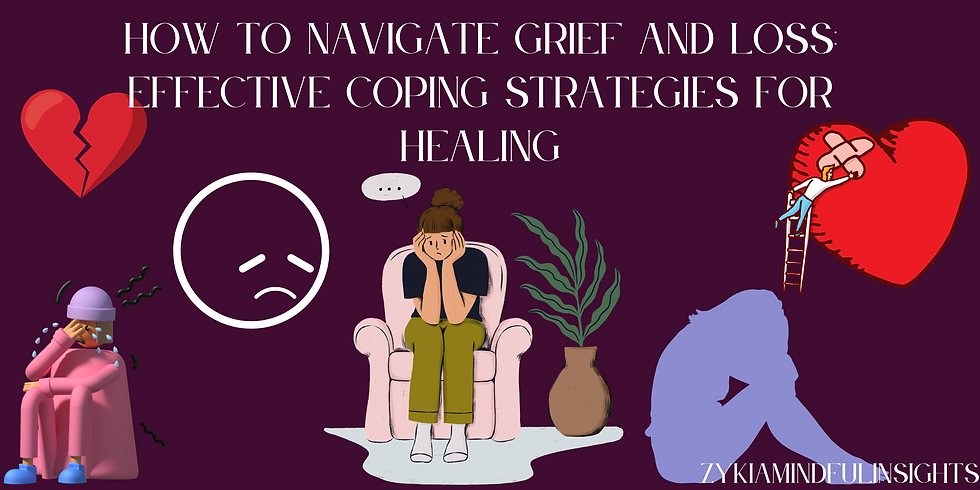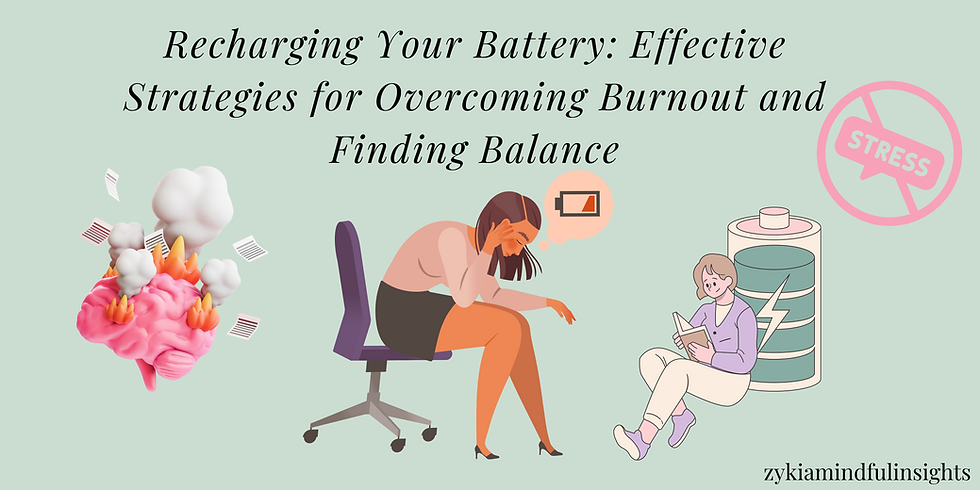How to Navigate Grief and Loss: Effective Coping Strategies for Healing
- Zykia Hannah

- Mar 2, 2024
- 6 min read
What is grief?
Grief is a natural and universal response to loss. It is a complex emotional process that includes a range of feelings such as sadness, anger, confusion, guilt, and even relief. Grieving is a normal part of life and is experienced differently by each individual. It is important to allow oneself to feel and express grief in order to process the loss and begin the healing journey.

Navigating grief and loss is a deeply personal and individual journey. There is no one-size-fits-all approach to coping with such an experience. However, there are several strategies that people commonly find helpful in the healing process:
Allow yourself to feel: Acknowledge your emotions, even the uncomfortable ones. Give yourself permission to grieve in your own way and at your own pace.
Seek support: Lean on friends, family, or a support group. It's essential to connect with others who can provide comfort, empathy, and understanding.
Engage in self-care: Take care of your physical and mental health. Practice good nutrition, exercise, and rest. Find activities that bring you joy and relaxation.
Create rituals: Establish rituals or traditions that honor the memory of your loved one. This could be as simple as lighting a candle, visiting a special place, or participating in a yearly event.
Express yourself: Find creative outlets to express your feelings. Writing, drawing, music, or other forms of art can be therapeutic.
Accept the process: Understand that grief doesn't have a timeline. It's normal to have ups and downs, and it's okay to feel moments of joy and sadness simultaneously.
Seek professional help: If you're struggling to cope, consider talking to a therapist or counselor who can provide guidance and support.
Remember, everyone's experience with grief is unique, so trust yourself to find what works best for you.
Navigating the treacherous waters of grief and loss can be an overwhelming and isolating experience. When the world around you feels uncertain and the future seems daunting, finding effective coping strategies is essential for healing.
Navigating grief and loss can be an intense and disorienting journey. As one grapples with the weight of the loss, it's common to feel a range of emotions—sadness, anger, confusion, guilt, and even relief. To navigate this difficult terrain, it's crucial to acknowledge these emotions, allowing them to surface and be processed. Suppressing feelings can exacerbate the pain and prolong the healing process. Remember, there's no right or wrong way to grieve. Each individual's experience is unique, and coping mechanisms will vary.
Seeking support from friends, family, or a support group can provide much-needed comfort and empathy. They can offer a safe space to express your emotions and share memories of your loved one. Connecting with others who have experienced similar losses can be especially beneficial. They can relate to your pain and offer valuable insights on navigating the grieving process. Additionally, a professional counselor or therapist can provide guidance and support in coping with loss, helping to process emotions and develop healthy coping strategies.
Engaging in self-care is essential during the grieving process. It's easy to neglect one's physical and mental well-being when consumed by grief, but taking care of oneself is crucial for healing. This includes maintaining a healthy diet, getting regular exercise, and ensuring adequate rest. Find activities that bring joy and relaxation, whether it's spending time outdoors, practicing mindfulness, or pursuing a hobby.
Creating rituals or traditions that honor the memory of your loved one can provide a sense of connection and comfort. These rituals can be as simple as lighting a candle, visiting a special place, or participating in a yearly event. These actions can serve as a reminder of the love and memories shared, helping to keep the spirit of your loved one alive in your heart.
Finally, it's essential to accept the process of grief as a natural and necessary part of healing. Understand that there's no timeline for grief, and it's okay to have moments of joy and sadness simultaneously. Allow yourself the space to feel and experience the emotions that arise, and trust that with time and self-care, healing is possible.
Myth and Facts about Grief and Grieving
Myth: Moving on with your life means forgetting about your loss.
Fact: Moving on means you've accepted your loss-but that's not the same as forgetting. You can move on with your life and keep the memory of someone or something you lost as an important part of you. In fact, as we move through life, these memories can become more and more integral to defining the people we are.
Myth: Grieving should last about a year.
Fact: There is no specific time frame for grieving. How long it takes differs from person to person.
Myth: If you don't cry, it means you aren't sorry about the loss.
Fact: Crying is a normal response to sadness, but it's not the only one. Those who don't cry may feel the pain just as deeply as others. They may simply have other ways of showing it.
Myth: It's important to "be strong" in the face of loss.
Fact: Feeling sad, frightened, or lonely is a normal reaction to loss. Crying doesn't mean you are weak. You don't need to "protect" your family and friends by putting on a brave front. Showing your true feelings can help them and you.
Myth: The pain will go away faster if you ignore it.
Fact: Trying to ignore your pain or keep it from surfacing will only make it worse in the long run. For real healing, it is necessary to face your grief and actively deal with it.
How to Deal with the Grieving process?
Although experiencing grief following a loss is an inevitable aspect of life, there exist methods to cope with the sorrow, come to terms with your grief, and ultimately, piece your life back together and move forward. These include:
Confront your pain. Recognize and accept your grief.
Realize that grief can evoke various, unforeseen emotions.
Comprehend that your grieving process will be specific to you.
Seek direct support from individuals who care for you.
Nourish yourself physically to sustain emotional strength.
Differentiate between grief and depression.
What are the Five Stages of Grief?
The five stages of grief, as outlined by Elisabeth Kubler-Ross in her book "On Death and Dying." are:
Denial: Initially, people may refuse to believe or accept the reality of the loss. They may block out emotions and thoughts about the loss, often feeling numb.
Anger: As the numbness wears off, emotions may rise to the surface, and the individual may feel intense anger and frustration. They may direct their anger toward others, themselves, or the situation.
Bargaining: Individuals may try to make deals with a higher power or a specific person in order to reverse or change the loss. They may promise to change their behavior or do anything to avoid facing the loss.
Depression: This stage involves a deep sense of sadness, often characterized by feelings of hopelessness, despair, and a lack of motivation. It may involve withdrawal from others and difficulty functioning in daily life.
Acceptance: In this final stage, individuals come to terms with the reality of the loss. They begin to integrate the loss of their life and find ways to move forward, although they may still experience moments of sadness or grief.
It's important to note that these stages do not always occur in a linear order, and not everyone will experience all five stages or in the same way. Grieving is a highly individual and complex process, and everyone's experience will be different.
Physical symptoms of Grief.
We often think of grief as a strictly emotional process, but grief often involves physical problems, including:
Fatigue
Nausea
Lowered immunity
Weight loss or weight gain
Aches and pains
Insomnia
Grieving a loss is an unavoidable part of life, and while the stages of grief are often discussed, it's essential to remember that everyone's experience is unique. People may go through the stages at different rates, in a different order, or even revisit stages multiple times. It's important to allow oneself to feel and process the range of emotions that accompany grief and seek support from family, friends, or a professional counselor. With time, self-care, and support, individuals can eventually find acceptance and a way to integrate the loss into their lives while honoring the memories of their loved ones.
🤍Quote of the day:
"Optimism is a happiness magnet. If you stay positive, good things and good people will be drawn to you." - May Lou Retton




Comments